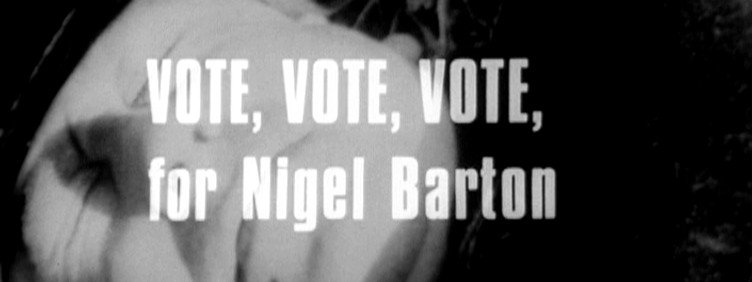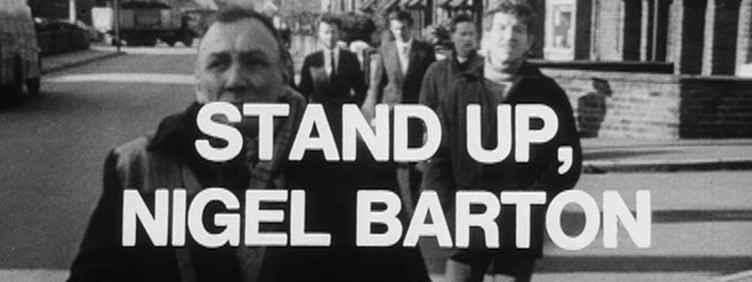
Previously on Dirty Feed, I took a look at the differences between the script taken into rehearsals for Dennis Potter’s 1965 play Stand Up, Nigel Barton, and what was finally broadcast. (Please read that first piece if you haven’t already; it contains a lot of background necessary for understanding this one.) This time, we take a look at Vote, Vote, Vote for Nigel Barton, broadcast the following week on the 15th December 1965. Fittingly enough, Vote – Potter’s cry of desperation about the state of politics – got bogged down in behind-the-scenes politics of its own, and ended up with a rather chequered production history. So first of all, it’s important to define what this article isn’t.
Unlike the relative peacefulness of Stand Up‘s production, Vote not only had a major rewrite, but that major rewrite was after the whole thing had been shot. Potter details in his introduction to the Penguin scriptbook The Nigel Barton Plays that the play was originally ready for broadcast on the 23rd June 1965, but that executives started to get cold feet and pulled the play seven hours before transmission.
Between June and the play’s eventual December broadcast, several scenes were rewritten and reshot. Needless to say, Potter wasn’t very happy about it.
“The result disfigures the play in a few important ways. Firstly, some of the savagery of Jack Hay’s cynicism had to be muted. It was argued that, in the original, the agent was ‘almost psychotic’. After much edgy negotiation, I was able to settle for what is now in the text – but I hope it will be clear […] that any further diminution in the bite or the fury of the part would have ruined the play.”
The crucial bit for us in terms of analysing the changes made to the text is the following:
“Like the new Jack Hay I, too, have my own ‘private grief’ and nothing will now induce me to publish the original Vote Vote Vote for Nigel Barton (nor the original of my Cinderella). These published texts are to be related to what was actually shown on the screen.”
Which means we have a somewhat different situation here compared to that with Stand Up, Nigel Barton. There, we could be certain that the text as published in The Nigel Barton Plays was what was taken into the rehearsal rooms. Here, Potter admits that the script published for Vote is not his original intention. These certainly aren’t transcripts, as there are plenty of differences between this script and what made it onto the screen – so they are presumably an amalgamation of his original script, and the specific scenes featuring Jack Hay which he delivered as rewrites.
So, what this article can’t detail is Potter’s original vision. You don’t get the old, even more twisted Jack Hay here, I’m afraid. We only have what is published in The Nigel Barton Plays to go on. We will, however, analyse the sections of the script which Potter admits were rewritten… and in at least a couple of instances, we can tell that the enforced rewrite on his character has entirely been ignored when it came to actually shooting the thing.
Enough background. Let’s get going. Material from the book is styled like this, and dialogue from the show as broadcast is styled like this. Note that I haven’t detailed every single change in wording between the script and the screen – only the stuff where there seemed to be an interesting point to make, or where there have been clear censorship issues.
[Read more →]
Read more about...
best of, dennis potter, edits, the nigel barton plays


